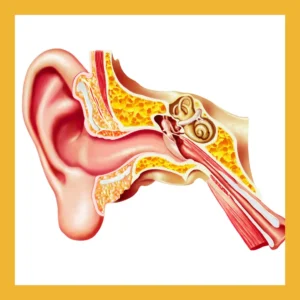Can Your Medication Cause Hearing Problems? Find Out Here
Medications can manage health conditions, but some may harm your hearing. Learn about what medicines can cause hearing problems and how to protect your hearing health.
How Medications Affect Hearing
Some medications can damage the inner ear, leading to hearing loss, ringing in the ears (tinnitus), or balance issues. These drugs, known as ototoxic medications, often impact older adults who take multiple medications.
Common Symptoms of Ototoxic Medications
Medications that cause hearing problems often present specific symptoms that can affect your daily life. Recognizing these symptoms early can help address any potential issues.
- Tinnitus: A ringing, thumping, or popping sound in the ears.
- Hearing Loss: Difficulty understanding speech, especially in noisy environments.
- Balance Problems: Feeling dizzy or unsteady on your feet.
If you experience any of these symptoms, it’s essential to consult with a healthcare provider to determine the cause and appropriate course of action.
Find out more about how long does tinnitus last.

Medications That Can Affect Hearing
Understanding what medicines can cause hearing problems is essential for protecting your hearing health. Here’s a breakdown of medications that might impact your ears:
Permanent Hearing Damage
Some medications can cause irreversible hearing loss. Knowing which medicines can have these permanent effects is crucial for safeguarding your hearing health. Here are the key culprits:
Aminoglycoside Antibiotics
Doctors often use Aminoglycoside antibiotics to treat severe bacterial infections. While effective, they pose a significant risk to hearing.
- Gentamicin: Commonly used in hospital settings for serious infections. It can cause permanent damage to the inner ear, leading to hearing loss.
- Kanamycin and Neomycin: These antibiotics are known for their strong antibacterial properties but are highly ototoxic. Neomycin, in particular, should be used cautiously, even in topical applications, as it can be absorbed through the skin and cause hearing loss.
- Streptomycin and Tobramycin: Both are effective against a range of bacteria but can lead to lasting hearing damage.
Chemotherapy Drugs
Certain chemotherapy agents, crucial for treating various cancers, can also cause noticeable and often progressive hearing loss.
- Cisplatin: Widely used for treating testicular, ovarian, and bladder cancers. Unfortunately, it is highly ototoxic and can result in permanent hearing loss.
- Carboplatin: Another chemotherapy drug that, while effective against cancer, poses a serious risk to hearing. The hearing loss from carboplatin is typically dose-dependent and can be severe.
Mechanisms of Damage
These medications damage the ear in several ways:
- Cochlear Damage: The cochlea converts sound into electrical signals for the brain. Damage here typically starts with high-frequency hearing loss and can progress to affect lower frequencies.
- Vestibular Toxicity: Some of these drugs also damage the vestibular system, causing balance issues and vertigo. This can lead to dizziness and an increased risk of falls.
- Stria Vascularis Impact: This part of the cochlea produces the fluid essential for hearing and balance. Damage here can disrupt the delicate fluid balance, further contributing to hearing and balance issues.
Preventive Measures
To protect your hearing, it’s essential to:
- Monitor Hearing Regularly: If you need to take these medications, regular hearing tests can help detect early signs of damage.
- Consult Healthcare Providers: Discuss any potential risks with your doctor. They might adjust the dosage or consider alternative treatments.
- Protect Your Ears: Avoid exposure to loud noises, which can exacerbate the ototoxic effects of these medications.
While these medications are essential for treating serious conditions, their potential impact on hearing cannot be overlooked. Being informed and proactive can help mitigate the risks. If you are taking any of these medications and notice changes in your hearing, contact your healthcare provider immediately for advice and potential interventions.
Temporary Hearing Damage
Certain medications can cause temporary hearing issues, often resolved once you stop taking the drug. Recognizing these medications and their effects can help you manage and protect your hearing health. Here’s a detailed look at the key culprits:
Pain Relievers
Some commonly used pain relievers, particularly when taken in high doses or for extended periods, can cause temporary hearing problems.
- Aspirin: High doses of aspirin can cause tinnitus (ringing in the ears) and temporary hearing loss. These symptoms usually disappear after discontinuing the medication.
- Ibuprofen: Often used for pain relief and inflammation, ibuprofen can lead to hearing issues when used in high doses. Tinnitus is a common side effect that typically resolves after stopping the medication.
- Naproxen: Similar to ibuprofen, naproxen is an NSAID that can cause prolonged tinnitus and temporary hearing loss.
Discover more about the common pain reliever acetaminophen and hearing loss.
Malaria Treatments
Medications used to treat malaria can also affect hearing, though these effects are usually reversible.
- Quinine: Historically used to treat malaria, quinine can cause temporary hearing loss and tinnitus. The hearing issues typically resolve once the drug is discontinued.
- Chloroquine: Another antimalarial drug, chloroquine, can cause hearing disturbances, especially with prolonged use. Hearing usually returns to normal after stopping the medication.
Loop Diuretics
Loop diuretics treat conditions like heart failure, high blood pressure, and edema. However, when administered in high doses, these medications can cause temporary hearing loss.
- Furosemide: Commonly known as Lasix, furosemide can cause hearing loss and tinnitus. These symptoms are usually reversible after discontinuing the medication.
- Bumetanide: Bumetanide is used to treat conditions similar to furosemide, but it can also lead to temporary hearing issues. The hearing loss typically improves once you stop the medication.
- Ethacrynic Acid: Another loop diuretic, ethacrynic acid, can cause temporary hearing loss, especially at high doses. Hearing usually returns to normal after discontinuing the drug.

Mechanisms of Temporary Hearing Damage
Temporary hearing loss from these medications occurs through various mechanisms:
- Cochlear Fluid Imbalance: Loop diuretics can disrupt the fluid balance in the cochlea, leading to temporary hearing loss.
- Inner Ear Inflammation: Pain relievers like aspirin and ibuprofen can cause inflammation in the inner ear, resulting in tinnitus and hearing loss.
- Ototoxic Effects: Some medications, like quinine, have direct ototoxic effects that impact hearing but are typically reversible.
While temporary hearing loss from these medications is typically reversible, being vigilant and proactive is essential. If you notice hearing issues while taking these drugs, consult your healthcare provider.
How Ototoxic Medications Work
Ototoxic medications can affect hearing in several ways:
- Vestibule Damage: Medications that damage the vestibule can cause dizziness and balance problems.
- Stria Vascularis Damage: The stria vascularis in the cochlea produces fluid necessary for hearing and balance. Damage here can disrupt this process.
- Cochlea Damage: The cochlea converts sound into electrical signals for the brain. Damage reduces the range of sounds you can hear.
If you experience phantom noises like ringing or thumping, you might have tinnitus. Typically, tinnitus stops when you discontinue the medication, but permanent hearing loss can occur with some drugs.
Hearing Risks for Older Adults
Our bodies undergo numerous changes as we age, and our hearing is no exception. Older adults are particularly vulnerable to hearing loss, partly due to the medications they take to manage various health conditions. Understanding these risks and taking proactive measures can help maintain hearing health in older age.
Common Medications and Their Impact on Hearing
Several drug classes commonly prescribed to older adults can contribute to hearing problems. Here’s an expanded look at these medications:
- Diuretics: Often prescribed for high blood pressure and fluid retention, diuretics like furosemide and bumetanide can cause electrolyte imbalances that affect the inner ear, leading to temporary or permanent hearing loss.
- Antibiotics: Aminoglycosides, such as gentamicin and neomycin, are highly effective against bacterial infections but can be ototoxic, causing irreversible hearing loss. Other antibiotics, like erythromycin and vancomycin, can also pose risks, especially at high doses.
- Nonsteroidal Anti-Inflammatory Drugs (NSAIDs): Prolonged use or high doses of NSAIDs like ibuprofen, aspirin, and naproxen can increase the risk of tinnitus and hearing loss. These medications treat pain and inflammation management.
- Antidepressants and Antipsychotics: Some medications in these classes, including selective serotonin reuptake inhibitors (SSRIs) and older tricyclic antidepressants, have been linked to hearing problems. The exact mechanisms are not fully understood, but they may involve changes in blood flow to the inner ear.
- Heart Medications: Beta-blockers, calcium channel blockers, and ACE inhibitors are essential for managing heart conditions but can sometimes affect hearing. These effects are usually dose-dependent and vary among individuals.
Increased Susceptibility to Hearing Loss
Older adults are more susceptible to hearing loss due to various factors:
- Age-Related Hearing Decline: The natural aging process can cause presbycusis, a gradual decline in hearing ability, particularly for high-frequency sounds. This makes it harder to distinguish speech from background noise.
- Polypharmacy: Many older adults take multiple medications simultaneously, increasing the risk of drug interactions and side effects, including hearing problems.
- Chronic Diseases: Conditions like diabetes, hypertension, and cardiovascular disease can impact blood flow and nerve function in the inner ear, contributing to hearing loss.
Tips for Elderly Patients and Caregivers
Maintaining good hearing health is essential for quality of life. Here are some practical tips for elderly patients and their caregivers:
- Regular Hearing Checks: Schedule regular hearing evaluations, especially if you are on multiple medications. Early detection of hearing loss can lead to more effective management.
- Medication Review: Work with your healthcare provider to review all medications you are taking. Identify those that might pose a risk to your hearing and discuss possible alternatives or adjustments.
- Monitor for Symptoms: Be vigilant for signs of hearing loss, such as difficulty understanding speech, asking people to repeat themselves, or experiencing ringing in the ears. Balance issues can also be a sign of ototoxicity.
- Communicate with Healthcare Providers: Discuss hearing concerns with your doctors and pharmacists. They can provide valuable insights and recommend safer medication options if necessary.
- Healthy Lifestyle Habits: Encourage a balanced diet, regular exercise, and avoiding excessive noise exposure. These habits can help maintain overall health and reduce the risk of hearing problems.
Older adults face unique challenges regarding hearing health, mainly due to the medications they need to manage chronic conditions. Our audiologists help you navigate these challenges and ensure your hearing health is well-maintained.
What to Do If You Suspect a Medication is Causing Hearing Problems
If you suspect that a medication is affecting your hearing, it’s crucial to act promptly. Here’s a comprehensive guide on what steps to take:
Recognize the Symptoms
First, identify potential signs of hearing problems:
- Tinnitus: Ringing, buzzing, or hissing sounds in one or both ears.
- Hearing Loss: Difficulty understanding conversations, especially in noisy environments.
- Balance Issues: Dizziness, vertigo, or feeling unsteady on your feet.
Recognizing these symptoms early can help prevent further damage.
Immediate Steps to Take
- Do Not Stop the Medication Abruptly: Never stop taking prescribed medication without consulting your doctor. Abrupt discontinuation can have serious health consequences.
- Contact Your Healthcare Provider: Schedule an appointment with your doctor as soon as possible. Explain the symptoms you’re experiencing and discuss your concerns.
- Prepare for Your Appointment: Make a list of all medications you are taking, including over-the-counter drugs and supplements. Note the onset and progression of your symptoms.
Consultation with Your Doctor
During your appointment, you should:
- Discuss Symptoms in Detail: Clearly describe the hearing issues and other symptoms. Mention when they started and if they have worsened over time.
- Review Medications: Your doctor will review your medication list to identify potential ototoxic drugs. They may suggest adjusting the dosage or switching to an alternative medication with fewer risks.

Monitoring and Follow-Up
To stay on track, you should:
- Get Regular Hearing Tests: Schedule periodic hearing evaluations to monitor your hearing health, especially if you continue taking medications that could affect your ears.
- Keep Track of Your Symptoms: Keep a diary of your symptoms, noting any changes or patterns. This information can be valuable for your healthcare provider.
Preventive Measures
To minimize the risk of medication-induced hearing problems:
- Communicate with Healthcare Providers: Always inform your doctors and pharmacists about any hearing issues you experience. This allows them to consider your hearing health when prescribing medications.
- Use Medications as Directed: Follow the prescribed dosage and duration instructions carefully. Avoid self-medicating or altering your medication regimen without medical advice.
- Stay Informed: Research potential side effects of your medications. Knowledge empowers you to recognize issues early and seek timely intervention.
- Protect Your Ears: Avoid exposure to loud noises, which can exacerbate hearing damage. Use ear protection in noisy environments.
- Healthy Habits: Maintaining a healthy lifestyle, including a balanced diet and regular exercise, supports overall well-being and reduces the risk of chronic conditions that may affect hearing.
Protect Your Hearing with Stanford Hearing
If you suspect medication-related hearing issues, contact Stanford Hearing for personalized advice and care. Our audiologists can help with early detection, monitoring, and managing hearing loss. Don’t let ototoxic medications impact your quality of life—reach out to us today for expert support and guidance.
